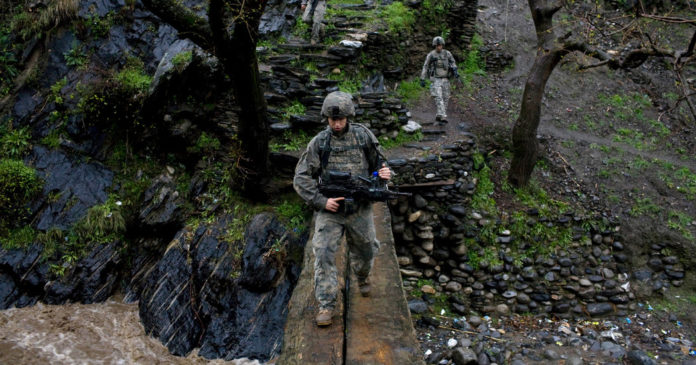At Fort Hood, Soto was greeted by a Viper Company squad leader, Staff Sgt. Nathan Cox. At 32, Cox was older than is typical for his rank. He had a deeply furrowed brow, a hint of graying hair, a college education and an aura of confidence rooted in previous tours in Bosnia and Iraq. He welcomed Soto in a straightforward manner, with a politeness that reflected his Catholic-school years in Iowa. Soto immediately liked him. Cox was a tattooed bookworm with a pensive side. After working under the tutelage of drill sergeants, with their outsize personas, Soto was drawn to his quieter, more composed and reflective demeanor. The platoon sergeant, Sgt. First Class Thomas Wright, assigned Soto as an ammunition bearer in a machine-gun team, a position for an F.N.G. — “fucking new guy” — on a fast track to war.
The company was busy readying for Afghanistan and spent weeks in the field, conditioning with long marches under heavy rucksacks and training with weapons. The more Soto came to know Sergeant Cox, the more fortunate he felt to work for him. Cox served in the Army in the ’90s, then returned to civilian life and studied for his bachelor’s degree. Like Soto, he was deeply affected by the terrorist attacks in 2001, and he began talking of serving again. But he was raising two stepchildren and an infant daughter with his wife-to-be, Annie, and did not want to disrupt their family while they had teenage children in school. He waited until 2005, as his stepdaughter was graduating from high school, to take his oath for a second time, returning, like Soto, to the Army as an infantry volunteer. Cox did a tour in Iraq before reporting to Fort Hood with Annie and their toddler, where he became a squad leader. In this role, he was expected to shape a new batch of soldiers into a fighting team. Like Soto, he was also an artist. Soto sang. Cox drew. Sometimes he sketched officers as they gave briefings, filling pages of his tactical notebooks with renderings in real time.
By spring, rumors circulated that Viper Company was being sent to the Korengal Outpost. It was in one of the most violent spots on the Afghan map, nicknamed the Valley of Death. Soto tried to keep others’ anxiety from gripping him. The company assumed a harsher edge. Warnings to pay attention were constant. I’m already paying attention, he thought. His attitude and seriousness were noticed; the company sent him to a course that trained backup medics, leading to an increase in his duties and role. Cox continued to impress him. As other sergeants showed signs of stress, there was no drama around the man. He projected a clear message: “This is what we’re doing, we know what we are doing and we are going to keep doing it.” He’s not clouding anything with that Korengal legend talk, Soto thought.
Late that spring, Cox hosted several young soldiers at the home on Fort Hood he shared with his family. It was one-half of an Army-managed duplex, a place in such poor condition that Annie and he referred to it as a government slum, the ’hood of Fort Hood. The battalion’s soldiers were being granted leave before flying away for a year, and the party, on a concrete patio outside their back door, was a chance to gather away from work and relax. Annie prepared food and welcomed her husband’s charges into her life. Cox grilled meat and served drinks and offered his out-of-uniform human side, impressing on his squad that each soldier was part of a team, and that he needed them, and that soon they would all need one another in profound ways.
There were things he did not share. Although few of his fellow soldiers knew it, Cox did not have to deploy to Afghanistan; he had been recruited to serve as a PsyOps soldier, and there was a position for him in the PsyOps field. He turned down the opportunity, confiding in Annie that he could not let his squad go to Afghanistan without him. He had been telling his soldiers they had to be there for one another. He intended to live by his words.
On the flight from the United States in July, Cox got his soldiers seated, then tried to relax. He ate and read part of a book but felt his wartime self settling over him, that blend of exhaustion and intensity, as he headed into his third war. “Saying goodbye was hard, took it out of me emotionally,” he wrote in his journal. “Flight gives way to deployment mind-set + compressed brain.”
Source : Nytimes













